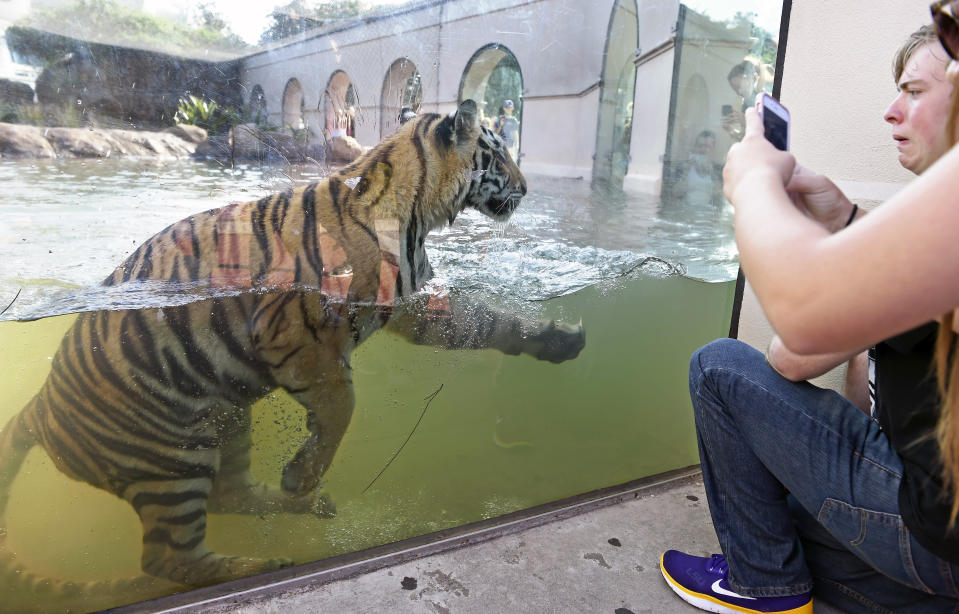More than 65K sign petition urging LSU to stop using live Tiger mascot

On Thursday, LSU marked the second birthday of its Tiger mascot named Mike VII.
On the same day, a petition urging the school to end its practice of holding a live tiger captive for entertainment approached its goal of 70,000 online signatures.
From the petition:
For the past few weeks, students all across the country have been heading back to school to embark on a brand new semester. But at Louisiana State University (LSU), the first day of school wasn’t just for students — it also marked the first day for Mike VII, the school’s most recent live mascot.
Mike VII isn’t the first tiger mascot LSU has used. In fact, he’s the seventh tiger — hence the name. His predecessor died last year from terminal cancer after living his last years confined in a limited space only to be allowed outside for display at football games.
The petition was created by Care2, an online activist group made up of “humanitarians, animal lovers, feminists, rabble-rousers, nature-buffs, creatives, the naturally curious, and people who really love to do the right thing,” according to its website.
LSU has held live Tigers since 1936
Mike VII, as his name indicates, is the seventh live tiger mascot LSU has held dating back to 1936 when an athletic trainer bought Mike I from an Arkansas zoo, according to The Advocate.
With awareness of the cruelty of holding wild animals captive rising, LSU has improved living conditions for its Tigers and curbed the inhumane practice of displaying caged Tigers at home games in a stadium packed with tens of thousands of people.
The birthday boy just wants to play with a balloon! pic.twitter.com/pXVNhL92rt
— Mary Frances Mayeaux Christopher (@mayfray_11) September 13, 2018
Mike VII came from exotic animal trade
Tigers are lone, roaming creatures that need open space to thrive. The exotic animal trade often glorified by athletes and celebrities holding wild creatures as status symbols encourages the practice and desensitizes others to the cruelty this sort of lifestyle inflicts on wild animals.
Mike VII was a product of the exotic animal trade, a Siberian-Bengal mix that does not exist in nature because their territories are so far apart, The Advocate reports. He was used for for-profit entertainment and picture-taking as a cub, a practice that often leads to animals being sent to a sanctuary or killed, according to the report.
A black market for Tiger parts such as rugs has motivated the killings of the animals whose wild populations are critically endangered.
LSU points out that Mike was saved from cruel lifestyle
LSU pointed to that fact when approached about the concerns of animal advocates.
“The university does not support the for-profit breeding of tigers,” media relations director Ernie Ballad told The Advocate. “By providing a home for a tiger that needs one, LSU hopes to raise awareness about the problem of irresponsible breeding and the plight of tigers kept illegally and/or inappropriately in captivity in the U.S.”
Care2: Animals in captivity send unhealthy message
Care2 representative Rebecca Gerber points out that holding Tigers in captivity devalues the animals from their natural role as wild predators.
“They should be in the wild and respected,” Gerber told The Advocate. “Even treated very kindly, it’s easier to see them as here entertainment, disposable props for football … We’re trying to stop that message completely.”
More from Yahoo Sports:
• Naomi Osaka reveals what Serena told her while fans booed at U.S. Open
• Mayor lifts Nike ban in Louisiana town following outcry
• Jags coach gets too ‘pissed off’ to watch Super Bowl
• Antonio Brown apologizes to reporter after sending threatening tweet

